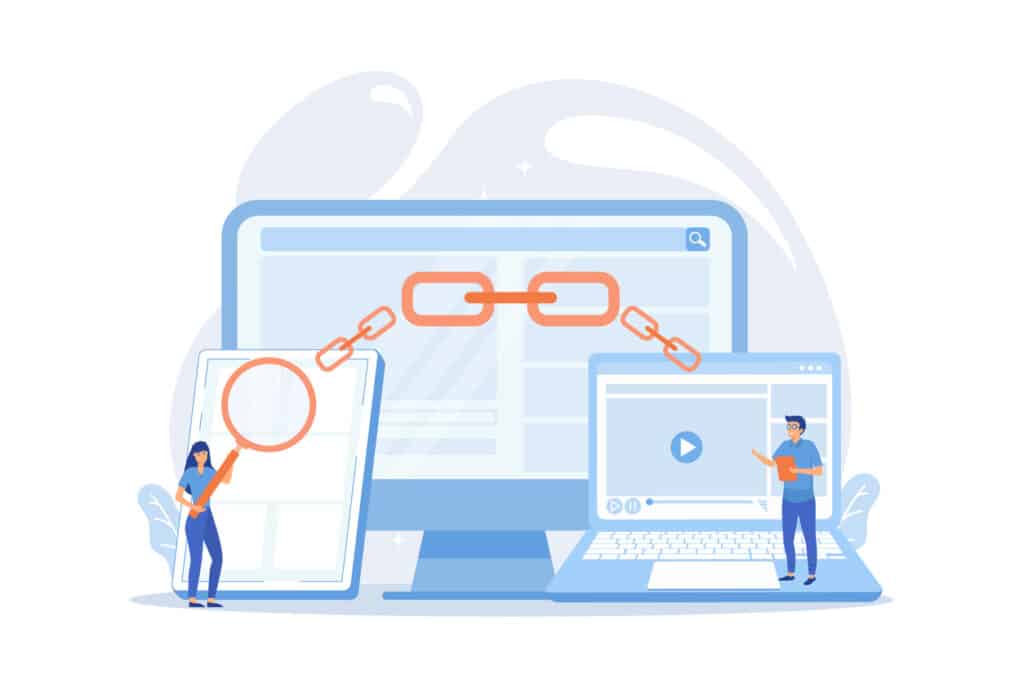If you’re trying to improve your website’s search engine ranking, backlinks are essential. But what are backlinks, exactly?
If you’re someone trying to understand what backlinks are and how they can be used to benefit your SEO efforts, you’ve come to the right place. In this guide, we’ll break down everything you need to know about backlinks – definition, how they work, and how you can use them to your advantage.
So, let’s get started!
What is a backlink?
A backlink, also known as an “inbound link,” is a link from another website to your own. When other websites link to your website, it’s an indication to search engines that your site is valuable and relevant – and the more backlinks you have, the higher your site will rank in search engine results pages (SERPs).
Backlinks are an important part of SEO because they help webpages rank higher in SERPs. In fact, backlinks are one of the most important ranking factors for SEO. That’s why it’s so important to build backlinks to your website!
So now that you know what backlinks are, let’s take a closer look at how they work…
What types of backlinks exist?
Backlinks come in many different forms and are created in a variety of ways. Here are some of the most common backlinks you’ll encounter:
Organic backlinks
Organic backlinks are backlinks that are naturally acquired through content creation, networking, and other SEO tactics. Organic traffic backlinks are generally seen as the most valuable backlinks for SEO, as they come from other websites that have established authority and trustworthiness.
Manual backlinks
Manual backlinks are backlinks created through link building campaigns. These backlinks are manually requested by the website owner or a third-party link building agency.
Editorial backlinks
Editorial backlinks are one of the most powerful forms of backlinks because they come from authoritative websites in your niche that have already put in the hard work to establish themselves as industry leaders.
Social media backlinks
Social media is another great way to acquire backlinks. When you share your content on social media platforms, you can both increase traffic to your web pages and get valuable backlinks from those platforms.
Guest blog post backlinks
Guest blog post backlinks are backlinks you acquire by writing a blog post on someone else’s website. These backlinks are especially valuable because they come from an authoritative source that already has an established readership and following.
Now that you know what backlinks are and the different types of backlinks that exist, let’s take a look at how to use backlinks to your advantage…
How to Use Backlinks for SEO
Quality backlinks can help improve your site’s search engine ranking in two ways:
Increase Traffic
Higher-ranking pages will draw more visitors, which means more organic traffic and potential customers or leads.
Improve Relevance & Authority
Quality backlinks from relevant websites will signal to search engines that your website is an authority on a particular subject and should, therefore, be ranked higher.
In order to get backlinks from reputable websites and maximize the SEO benefit of backlinks, you’ll need to create content that’s valuable and high-quality. That means creating content that is informative, entertaining, and uniquely yours. Once you have established yourself as an authority in your niche through content creation, it will be easier to acquire backlinks from other sites.
You can also use link building tactics such as manual backlinking campaigns or social media backlinks to help increase the number of backlinks pointing to your website. However, it’s important to make sure any backlink acquisition campaign you undertake adheres to search engine guidelines.

What makes a good backlink?
In today’s search engine optimization landscape, backlinks are still a key ranking factor for search engine algorithms. As such, it is important to know what makes a good backlink and what criteria you should use when assessing backlinks.
Relevance
Quality backlinks should be relevant to the content on your website and provide value to readers. A backlink from a website that is in the same niche as yours will help improve your search engine ranking. Just remember, multiple backlinks from sites outside of your niche can confuse Google and actually make your ranking worse.
Anchor Text
Anchor text is the group of words that are hyperlinked back to your website. For example, if the backlink is “click here,” then “click here” would be considered the anchor text. The anchor text of a backlink should be descriptive and relevant to the page it links to. This will help search engines understand what the backlink is about and its relevance to the content on your website.
Quality
The backlink should come from a reputable source that is popular in your niche. The website should have quality content and a good backlink profile.
Authority
The backlink should come from an authority site. You should try to get backlinks from websites that rank for keywords within your niche and are known for consistently putting out good content. This will signal to search engines that your website is an authoritative source of information.
By understanding backlinks and the criteria used to assess them, you can ensure that your backlink acquisition efforts are effective and compliant with search engine guidelines. With a solid backlink strategy in place, you will be able to improve your site’s SEO rankings and increase its visibility in search results.
How can you build backlinks?
Building backlinks is a process that requires time, effort, and creativity. Here are some of the best ways to build backlinks for your website:
Guest blogging
Guest blogging is one of the best ways to build backlinks. You can search for websites in your niche that accept guest blog posts and then write a post with a backlink to your website.
Social media backlinking
Social media backlinking involves sharing your content on social media platforms such as Twitter and Facebook. This is a great way to get backlinks from other sites, as well as increase the visibility of your content.
Link exchange
Link exchange is a tactic in which two websites agree to link back to each other’s websites. This can be an effective way to build backlinks, but it should be done carefully so that you don’t end up linking back to low-quality or spammy websites. Learn more about how to stay on Google’s good side and exchange links the right way.
Broken link building
Broken link building is a process in which you search for broken links on other websites and then contact the website owner to replace them with backlinks to your site. This can be an effective way to build backlinks but requires some research.
Unlinked brand mentions
Unlinked brand mentions backlinks are backlinks you acquire by finding websites that mention your brand but don’t link back to it. Linking back to these websites is a great way to get backlinks without having to request them yourself.
PR
PR backlinks are backlinks you acquire by engaging in PR activities such as issuing press releases, interviewing industry experts, or writing thought leadership pieces. These backlinks show search engines that your website has credibility and authority.
Now that we know the definition of backlinks and how they can be used to boost SEO efforts, let’s discuss some best practices for link building.

The do’s and don’ts of link building
When it comes to backlinks, there are some important dos and don’ts to keep in mind. Here is a list of the most important link building dos and don’ts:
DO
- Research backlink opportunities: There are numerous backlink opportunities available to website owners, but it is important to research each one carefully in order to ensure it is a quality backlink.
- Ensure backlinks are from relevant sites: High quality backlinks are most effective when they come from relevant websites. That means backlinking back to your website from sites that have content related to yours.
- Use unique and valuable content: The content you create for backlinking strategies should be unique and valuable in order to make the backlinks effective.
- Stick to relevant websites with higher domain authority: Websites with higher domain authority are more likely to pass on link juice, so it is important to stick to backlinking from these sites.
- Be selective about backlinking: Be selective about website backlinks, and only link back to websites that have relevance to yours.
- Make sure backlinks are genuine and helpful for users: Backlinks should be genuine and helpful to users, as search engines are likely to penalize websites with backlinks that appear to be spammy or irrelevant.
- Research competitors’ backlinks: Research the backlinks of your competitors in order to know what backlink strategies are working for them, as well as potential backlink opportunities you can use.
DON’T
- Don’t engage in backlink schemes or purchase backlinks: Backlink schemes and backlinks purchased from spammy websites won’t benefit your website in the long run.
- Don’t link back to irrelevant or low-quality websites: Linking back to low-quality websites can hurt your rankings in search engine result pages (SERPs).
- Don’t use duplicate or stolen content: Backlinks should be original and unique, not copied from another website.
- Don’t overdo backlinking: Backlinks should be built slowly and strategically in order to avoid any potential penalties from search engines.
- Don’t use keyword stuffing: Backlinks should be used to naturally link back to your website and not as a way of keyword stuffing.
By adhering to these guidelines and understanding the definition of backlinks, you can successfully use backlinks to your advantage and increase the visibility of your content. Building backlinks is a multi-step process that requires research, outreach, and strategic link building efforts in order to be successful. With some dedication and effort, backlinking can become a powerful tool for boosting your search engine rankings.
Final note
So what do all of these dos and don’ts have in common? In order to build backlinks effectively, it is important to remember that quality always trumps quantity.
Backlinks should be genuine and helpful for users, not spammy or irrelevant. Additionally, backlinking should be a part of a comprehensive link building strategy that includes research into backlink opportunities and the use of valuable, unique content. By following these guidelines, you can use backlinks to your advantage and improve your website’s search engine rankings.
If you’re looking for more information on backlinks and how to use them effectively in your SEO efforts, be sure to check out our further reading section below!
Frequently Asked Questions
What’s the difference between links and backlinks?
Links are simply hyperlinks that link back to a particular website or web page, while backlinks are links from outside sources that lead back to your website.
Why is it called a backlink?
Backlinks are called backlinks because they “link back” to a particular website or web page.
Why are backlinks important?
Backlinks are important because they help search engines understand the relevance of a particular website or web page. They also help to increase visibility and drive traffic back to your site through search engine optimization.
What is competitive backlink research?
Competitive backlink research is the process of researching backlink opportunities from other websites in your niche. This can help you gain insight into what backlinking strategies your competitors are using, and how you can use those backlinks to your advantage.
Does Google Search Console track backlinks?
Yes, Google Search Console can track backlinks that point back to your website. This allows you to monitor backlink activity and identify any potential issues with your backlinking strategy.
What are external links vs inbound links?
Generally speaking, external links are links from your own website that link out to other websites. Inbound links, on the other hand, are almost synonymous with backlinks. Meaning, they are links from other sites that link back to your own. It’s important to note that backlinks are generally considered to be external links, while inbound links can be external or internal, depending on what the source domain is. An internal inbound link is a link to a certain page within your website from other pages on your website. An external inbound link is a backlink – a link from another domain to yours.




